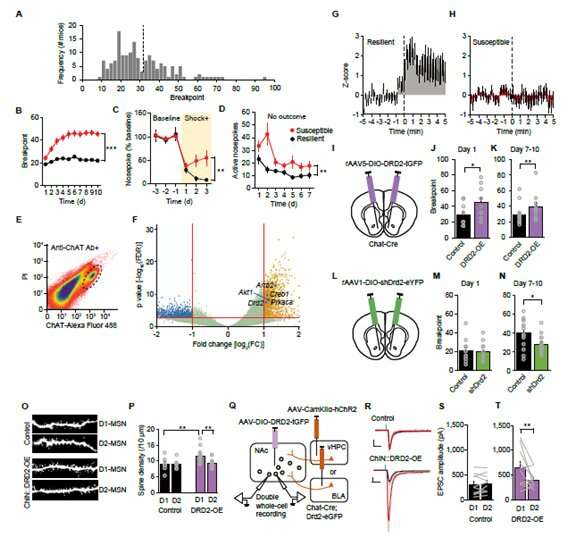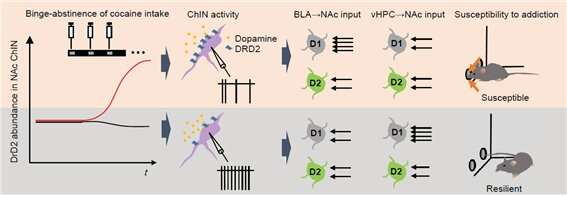Some people are easily addicted to drugs but others are not, new research shows

Korea Brain Research Institute (KBRI, President Pann Ghill Suh) announced on May 26 that a joint research team, led by Prof. Joung-Hun Kim and Dr. Joo Han Lee at the Pohang University of Science and Technology (POSTECH), Dr. Ja Wook Koo at the KBRI, and Prof. Eric Nestler at the Icahn School of Medicine at Mount Sinai, discovered that dopamine D2 receptors (DRD2s) in cholinergic interneurons (ChINs) play a crucial role in cocaine addiction.
The findings were published in Biological Psychiatry, a leading academic journal in the field of psychiatry. The title and authors of the paper are as follows:
Drug addiction is a mental disorder in which a person obsessively seeks out and uses drugs (narcotics) despite their harmful effects. It can lead to interpersonal conflict and physical health problems, thereby incurring significant social costs. Once consumed, drugs of abuse (e.g. cannabis and cocaine) increase the dopamine concentration in the brain's reward system and activate dopamine receptors, which, in turn, causes intense craving for drugs.
However, there are individual differences in drug addiction. Some people are more vulnerable to addiction when exposed to similar dose of addictive drug. Yet, the neurobiological mechanism underlying such phenomenon remains elusive.
By applying electrophysiological and optogenetic techniques to a cocaine self-administration model, the research team identified DRD2 overexpression in cholinergic interneurons (ChINs) of the nucleus accumbens (NAc) of mice susceptible to addiction.

Addiction-susceptible mice showed an increased level of DRD2 expression and a reduced level of cell activation, which is caused by dopamine D2 receptors expressed excessively in ChINs as the receptor activation reduces ChIN activity.
Through this mechanism, ChINs can affect the activation and synaptic plasticity of downstream medium spiny neurons (which comprise most of the NAc neurons) in diverse ways, thereby causing susceptibility to cocaine addiction.
"By exploring at the genome-wide level, the gene expressions within ChINs that occur in different individual entities, we have pioneered a new area in addiction research," the joint research team of KBRI and POSTECH said. "As a part of follow-up research, we will continue to study a detailed molecular mechanism underlying how addicted animals show elevated expressions of DRD2. Searching for any candidate drugs that can control such susceptibility by regulating activity of ACh receptors might be another feasible future plan."
More information: Joo Han Lee et al, Dopaminergic regulation of nucleus accumbens cholinergic interneurons demarcates susceptibility to cocaine addiction, Biological Psychiatry (2020). DOI: 10.1016/j.biopsych.2020.05.003


















